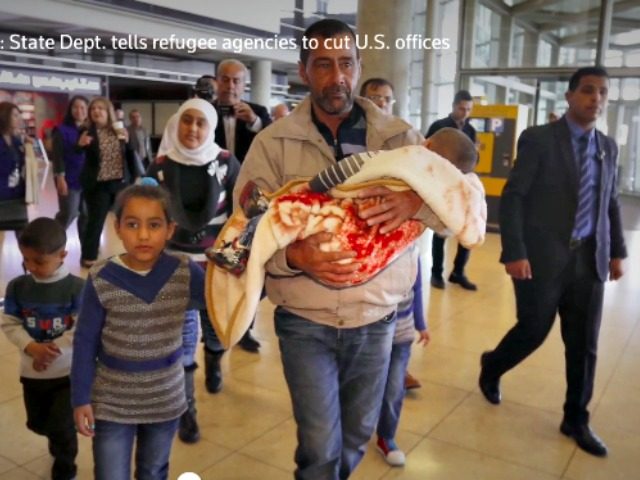Refugee admissions to the United States fell to a new low during the first two weeks of January.
Between January 1 and January 15, the number of refugees admitted into the country fell to a mere 201, the lowest number admitted during any two week period in more than a decade.
Seventy-nine percent of these refugees, or 158 out of 201, came from four countries: Ukraine (80), Burma (29), Bhutan (28), and Eritrea (21).
The religious mix of arriving refugees continued the trend seen in the first three months of FY 2018 from September 1, 2017 to December 31, 2017: More Christians and fewer Muslims than under the Obama adminstration.
Eighty-five percent of these refugees, or 171 out of 201, were Christian, while only four percent, or eight out of 201, were Muslim.
This contrasts dramatically with the last full fiscal year of the Obama administration, FY 2016, when 46 percent of the 84,995 admitted refugees were Muslim and 44 percent were Christian.
Overall, refugee admissions are down dramatically so far in FY 2018. During the first three months and two weeks of FY 2018 (September 1, 2017 to January 15, 2018), only 5,524 refugees have been admitted.
This represents an 80 percent decline from the same three months and two weeks period of FY 2017 (September 1, 2016 to January 2015, 2017), the last days of the Obama administration, when 27,508 refugees were admitted.
Historically, the first two weeks of January have been a slow period for refugee arrivals.
During the 16 years between 2002, the earliest year for which such data is currently available, to 2018, refugee arrivals during the January 1 to January 15 period have ranged from a low of 201 in calendar year 2018 to a high of 2,472 in calendar year 2015.
Voluntary agencies (VOLAGS), who have been paid more than $1 billion a year by the federal government for more than the past decade to resettle refugees, are beginning to feel the financial pressure caused by the reduced revenue associated with fewer refugee arrivals.
“A ‘demonization’ of refugees is threatening the International Rescue Committee’s basic mission and existence, suddenly placing them ‘on the defensive,’ ” David Miliband, President of the IRC, one of the nine largest VOLAGs, told Devex.com earlier this month.
“The U.S. State Department has told refugee agencies it will sharply pare back the number of offices across the country authorized to resettle people in 2018 as President Donald Trump cuts the number of refugees allowed into the United States,” Reuters reported last month, adding:
The announcement was made at a Dec. 1 meeting in Washington with State Department officials and representatives from nine major refugee agencies, several executives of the agencies said.
Advocates said the decision is likely to lead to the closure of dozens of resettlement offices around the country, potentially leaving some refugees without access to services that help them integrate into American life. Several state refugee coordinators said they had also been made aware of the closures.
Refugee resettlement in the United States is handled by nine non-profit agencies that receive funding from the federal government for some of their refugee work. They partner with, or oversee, hundreds of local offices in nearly every state that help new arrivals with basic tasks like enrolling children in school, arranging doctors’ visits and applying for Social Security cards and other documents.
A number of local resettlement agencies operating under the broader umbrella of the VOLAGs around the country are either shutting down their operations and shrinking them dramatically.
“Catholic Charities of the Archdiocese of Dubuque [Iowa] is preparing to end its refugee resettlement program after 77 years in operation. The primary reason the program is closing down is because the numbers of refugees are down,” Catholic News Service reported last week.
“Donna Markham, O.P., president and C.E.O. of Catholic Charities USA, is concerned that the Dubuque refugee office is only the beginning of what could become a nationwide shuttering of other small refugee resettlement efforts,” America Magazine reported last week, adding:
“We have received some indication that those agencies that are serving under 100 resettlement clients a year are at risk for being discontinued, of losing their federal contracts,” she said on Jan. 9. “So some of the agencies that are very small are threatened.” . . .
“We think that 25 to 30 percent of our agencies are at risk,” Sister Markham said. That means as many as 17 to 23 Catholic Charities offices around the country are now confronting the end of programs that have been successfully assimilating thousands of refugees into U.S. society for decades. Altogether about 70 of Catholic Charities USA’s 166 offices maintain refugee programs.
The potential loss in institutional memory, expertise and experience, according to Sister Markham, is incalculable.
The Tennessee Star reported in December:
Catholic Charities of Tennessee State Refugee Coordinator Holly Johnson has confirmed that the federal refugee resettlement contractor Bridge Refugee Services, may have to close its Chattanooga office due to new guidance from the U.S. State Department which reportedly informed voluntary agencies (VOLAGs) that any of their local offices expecting to resettle fewer than 100 refugees in 2018, “will no longer be authorized to resettle new arrivals.”
Refugee admissions to the United States have declined steadily since FY 2016, the last full year of the Obama administration, when 84,995 refugees were admitted to the country.
In FY 2017, 53,716 refugees were admitted.
In September, President Trump set the ceiling of new refugee admissions for FY 2018 at 45,000.
Based on the current rate of admissions, total FY 2018 numbers are likely to be well under that number. If refugee admissions continue at the same pace as they have for the first three and a half months of FY 2018 for the remaining eight and a half months of the fiscal year, total refugee arrivals for the fiscal year will be slightly less than 19,000.

COMMENTS
Please let us know if you're having issues with commenting.